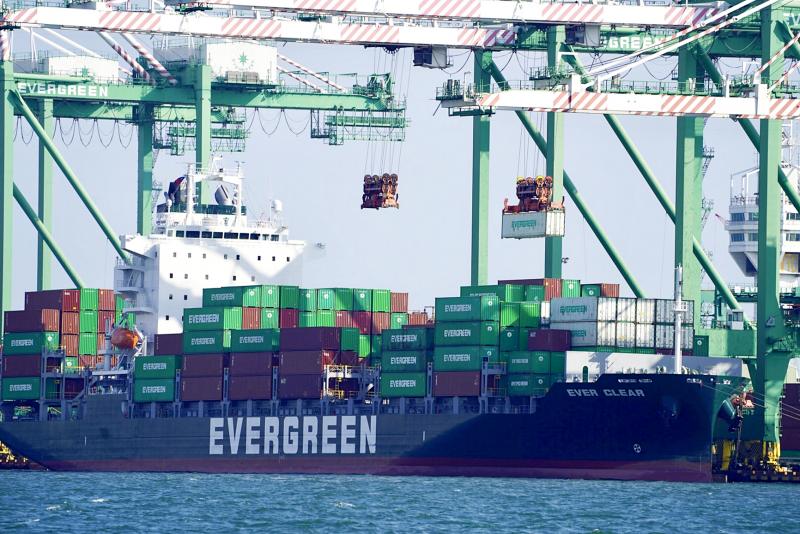Exports last month surged 38.7 percent year-on-year to US$34.96 billion, the second-highest value in history, as local firms benefited from an across-the-board increase in demand, the Ministry of Finance said yesterday.
A pickup in economic activity around the world also lent support to inventory building for tech and non-tech products, pushing up their selling prices, during a historically slow season, Department of Statistics Director-General Beatrice Tsai (蔡美娜) told a news conference in Taipei.
“Exports could stay above the US$30 billion mark for this month, or an increase of 25 to 31 percent from a year earlier,” Tsai said, adding that material, component and capacity shortages could persist until next year, based on the guidance of major tech firms.

Photo: CNA
Taiwan is home to the world’s leading contract makers of electronics used in smartphones, personal computers, TVs, vehicles, as well as artificial intelligence and Internet of Things applications. The second quarter is usually a low season for technology brands to digest inventory before the launch of next-generation products in the fall.
Shipments of electronics spiked 38.6 percent to US$13.51 billion, propelled by a 34.9 percent increase in semiconductors, a 44.1 percent bump in LEDs, a 35.2 percent pickup in capacitors and a 10.6 percent growth in printed circuit boards, the ministry’s report showed.
Exports of information and communications technology devices expanded 35.9 percent to US$4.71 billion on the back of demand for personal computers and accessories, data storage devices, routers, switches and related products, it said.
The COVID-19 pandemic has accelerated the digital transformation of companies and organizations, while 5G wireless communication and other new technologies are gaining momentum, Tsai said.
The boom extended to non-tech sectors, with chemicals, minerals, textiles, base metals and plastics reporting sweeping comebacks, with growth ranging from 27 percent to 128.8 percent, the ministry said.
Shipments of transportation tools grew 68.5 percent, while electrical products soared 33.1 percent, it added.
Warming global economic activities and a low base last year accounted for the impressive showings, it said.
Meanwhile, imports jumped 26.4 percent to US$28.79 billion, the ministry said.
Imports of capital equipment rose 39.2 percent from a year earlier, while industrial and agricultural raw materials saw an advance of 27.7 percent, it said.
The latest trade figures gave Taiwan a trade surplus of US$6.18 billion, more than doubling the year-ago level, it said.
For the first four months of the year, exports increased 28 percent to US$132.91 billion, while imports expanded 22.4 percent to US$112.36 billion, it said.

COMPETITION: AMD, Intel and Qualcomm are unveiling new laptop and desktop parts in Las Vegas, arguing their technologies provide the best performance for AI workloads Advanced Micro Devices Inc (AMD), the second-biggest maker of computer processors, said its chips are to be used by Dell Technologies Inc for the first time in PCs sold to businesses. The chipmaker unveiled new processors it says would make AMD-based PCs the best at running artificial intelligence (AI) software. Dell has decided to use the chips in some of its computers aimed at business customers, AMD executives said at CES in Las Vegas on Monday. Dell’s embrace of AMD for corporate PCs — it already uses the chipmaker for consumer devices — is another blow for Intel Corp as the company

MediaTek Inc (聯發科) yesterday said it is teaming up with Nvidia Corp to develop a new chip for artificial intelligence (AI) supercomputers that uses architecture licensed from Arm Holdings PLC. The new product is targeting AI researchers, data scientists and students rather than the mass PC market, the company said. The announcement comes as MediaTek makes efforts to add AI capabilities to its Dimensity chips for smartphones and tablets, Genio family for the Internet of Things devices, Pentonic series of smart TVs, Kompanio line of Arm-based Chromebooks, along with the Dimensity auto platform for vehicles. MeidaTek, the world’s largest chip designer for smartphones

TECH PULL: Electronics heavyweights also attracted strong buying ahead of the CES, analysts said. Meanwhile, Asian markets were mixed amid Trump’s incoming presidency Taiwan Semiconductor Manufacturing Co (TSMC, 台積電) shares yesterday closed at a new high in the wake of a rally among tech stocks on Wall Street on Friday, moving the TAIEX sharply higher by more than 600 points. TSMC, the most heavily weighted stock in the TAIEX, rose 4.65 percent to close at a new high of NT$1,125, boosting its market value to NT$29.17 trillion (US$888 billion) and contributing about 400 points to the TAIEX’s rise. The TAIEX ended up 639.41 points, or 2.79 percent, at 23,547.71. Turnover totaled NT$406.478 billion, Taiwan Stock Exchange data showed. The surge in TSMC follows a positive performance

FUTURE TECH: Nvidia CEO Jensen Huang would give the keynote speech at this year’s Consumer Electronics Show, which is also expected to highlight autonomous vehicles Gadgets, robots and vehicles imbued with artificial intelligence (AI) would once again vie for attention at the Consumer Electronics Show (CES) this week, as vendors behind the scenes would seek ways to deal with tariffs threatened by US president-elect Donald Trump. The annual Consumer Electronics Show opens formally in Las Vegas tomorrow, but preceding days are packed with product announcements. AI would be a major theme of the show, along with autonomous vehicles ranging from tractors and boats to lawn mowers and golf club trollies. “Everybody is going to be talking about AI,” Creative Strategies Inc analyst Carolina Milanesi said. “From fridges to ovens